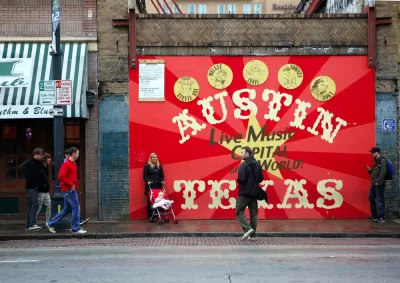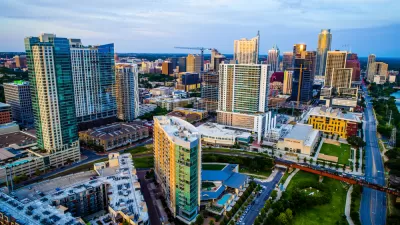The Texas capital's iconic music scene could suffer as higher housing costs push musicians out of the city.

Inexpensive housing helped build Austin's thriving music scene, writes Miles Bloxson. For decades, musicians flocked to the city, taking advantage of affordable rents and home prices to build one of the country's most vibrant music communities. But now, the explosive rise in housing costs could effectively destroy it. According to the author of the 2015 Austin Music Census, Nikki Rowling, "musicians’ incomes have ‘not kept up with the times or inflation or affordability issues in any way.’” Today, one fifth of Austin musicians live below the poverty line, with close to a third living just above it.
Even before the pandemic, Austin musicians had started leaving the city to search for more affordable housing. Since 2009, the average home price rose from $187,000 to $500,000, with prices rising by $100,000 in the first half of 2021 alone and average rents going up by roughly $300.
Meanwhile, housing construction in Austin and other booming cities around the country is experiencing delays due to supply chain and labor problems, while costs continue to skyrocket in an overheated housing market made more competitive by the pandemic. Left to market forces, many of Austin’s musicians may find themselves forced to relocate to more affordable communities.
FULL STORY: How Austin's housing market helped build the music scene, and how it could destroy it

Alabama: Trump Terminates Settlements for Black Communities Harmed By Raw Sewage
Trump deemed the landmark civil rights agreement “illegal DEI and environmental justice policy.”

Study: Maui’s Plan to Convert Vacation Rentals to Long-Term Housing Could Cause Nearly $1 Billion Economic Loss
The plan would reduce visitor accommodation by 25% resulting in 1,900 jobs lost.

Planetizen Federal Action Tracker
A weekly monitor of how Trump’s orders and actions are impacting planners and planning in America.

Waymo Gets Permission to Map SF’s Market Street
If allowed to operate on the traffic-restricted street, Waymo’s autonomous taxis would have a leg up over ride-hailing competitors — and counter the city’s efforts to grow bike and pedestrian on the thoroughfare.

Parklet Symposium Highlights the Success of Shared Spaces
Parklets got a boost during the Covid-19 pandemic, when the concept was translated to outdoor dining programs that offered restaurants a lifeline during the shutdown.

Federal Homelessness Agency Places Entire Staff on Leave
The U.S. Interagency Council on Homelessness is the only federal agency dedicated to preventing and ending homelessness.
Urban Design for Planners 1: Software Tools
This six-course series explores essential urban design concepts using open source software and equips planners with the tools they need to participate fully in the urban design process.
Planning for Universal Design
Learn the tools for implementing Universal Design in planning regulations.
Caltrans
Smith Gee Studio
Institute for Housing and Urban Development Studies (IHS)
City of Grandview
Harvard GSD Executive Education
Toledo-Lucas County Plan Commissions
Salt Lake City
NYU Wagner Graduate School of Public Service




























